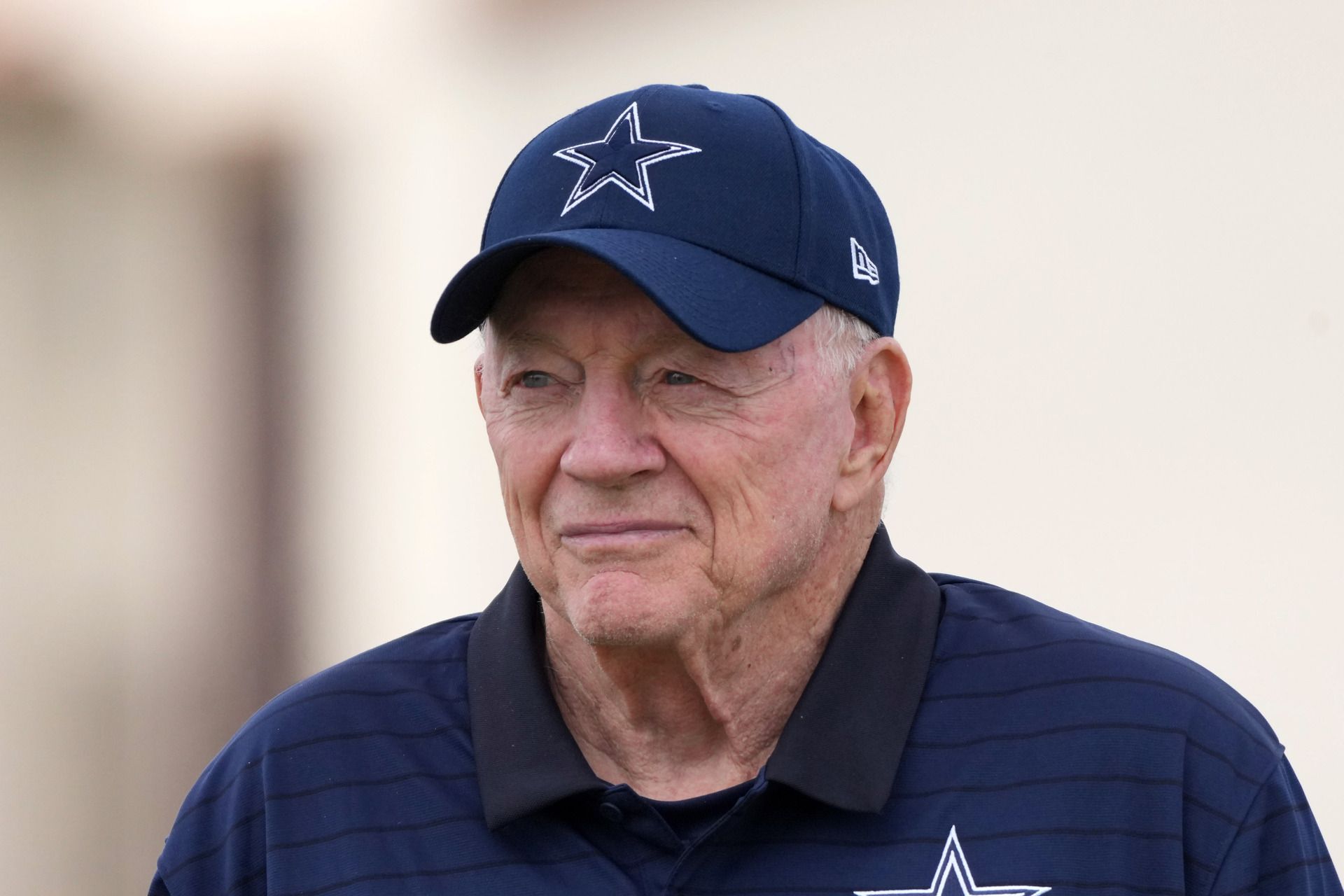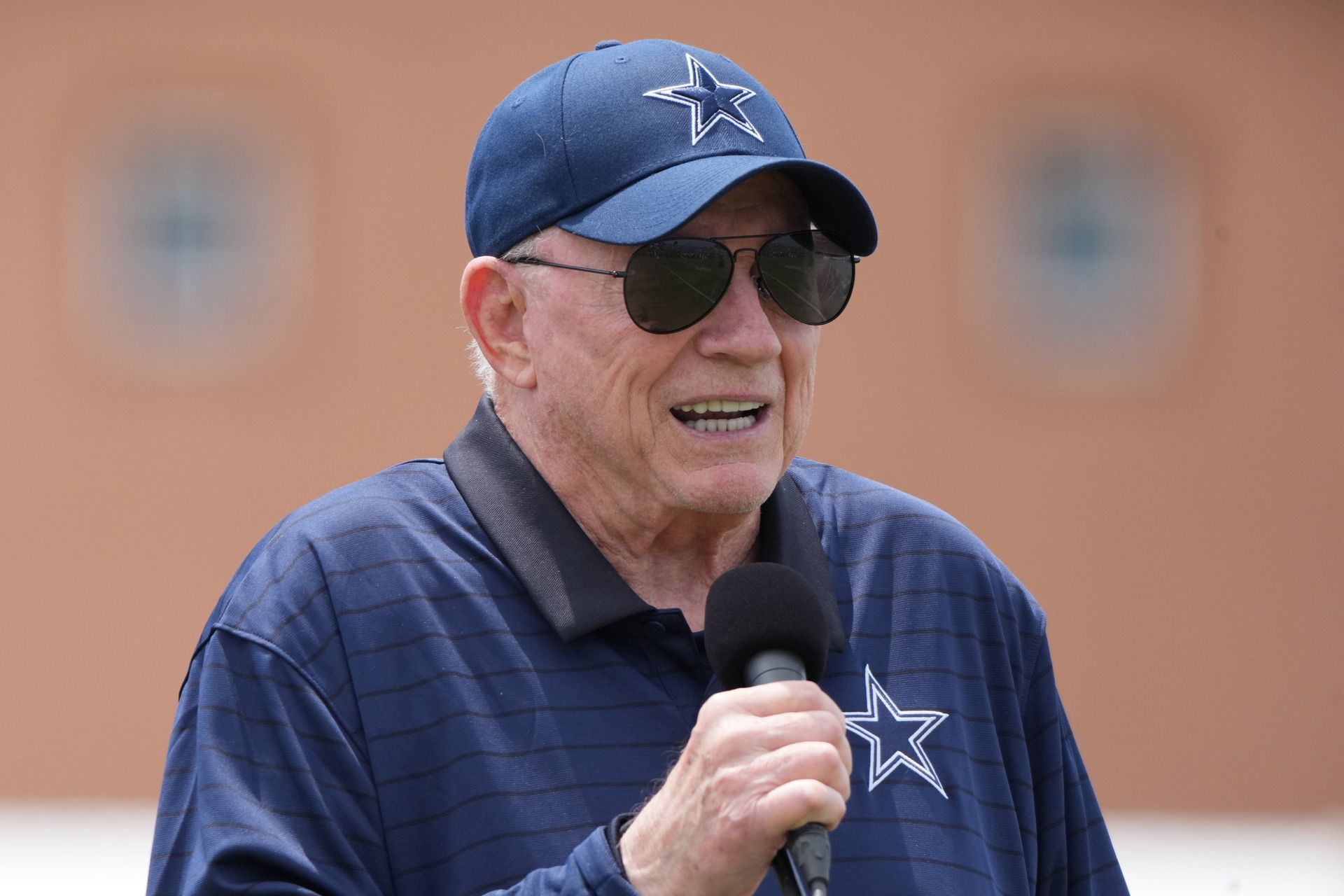- Gridiron Wallet
- Posts
- Jerry Jones’ Playbook on Investments
Jerry Jones’ Playbook on Investments

Welcome to Gridiron Wallet — where NFL players don’t just chase rings, they chase bags. From million-dollar grills to side hustles that slap, we’re decoding how football’s finest make it, spend it, and sometimes… fumble it. 🏈🔥
The latest edition of our newsletter covers Jerry Jones:
Energy & Resource Empire
Real Estate, Hospitality & Media Infrastructure
Tech, Sports Equity & Strategic VC

💸Here Comes the Money
Energy & Resource Empire

Jerry Jones and his negotiating tactics have received quite a lot of flak of late. Because of his habit of delaying big deals, he ended up paying far more than he would have with extensions for QB Dak Prescott (the highest-paid QB) and wideout CeeDee Lamb (the second-highest-paid WR at the time of signing).
As things stand, if the Dallas Cowboys’ longtime owner and general manager wants to get Micah Parsons back in the fold, he’ll likely have to overpay for him as well.
Jones is turning 83 years old in October. So it’s fair that he’s not as sharp as he was earlier. And honestly, he doesn’t need to be.
On the field, his Cowboys have struggled in the last 30 years of his 36-year ownership tenure. But on the business side, Jones has successfully maintained Dallas’ perch atop the most valuable sports franchises in the world. Most recently, in 2024, the club was valued at $11 billion, $3 billion more than the next most valuable franchise.
He may have lost his touch when negotiating contracts with players, but Jones has not lost his mojo when it comes to major business dealings. However, he didn’t start as a shrewd businessman.
Early on, he had several failed ventures, including a pizza parlor franchise and an attempt to buy the San Diego Chargers. Jones later started working at his millionaire father’s insurance company.
Using money earned there, he launched his first successful business, an oil and gas exploration company called Jones Oil and Land Lease, in the 1970s.
He may not be great when it comes to identifying talent, but he certainly knew how to pick an oil well. An astonishing 12 of his first 13 wells struck oil, leading to massive early success.
After investing just $15 million in that drilling land, he sold the company for $175 million in 1986. However, he still owns Arkoma Drilling and has spent over $1 billion on unorthodox drilling.
Three years later, he bought the Dallas Cowboys for $140 million.
He has continued to maintain his interests in the energy and resource sectors. In 2018, he flipped $620 million in oil assets for a majority stake in Comstock Resources, an independent energy and oil company. Through Covery Park Energy, he later invested another $475 million in the company. Last year, he put in an additional $100 million to push his stake up to 67 percent.
Jones’ finger may no longer be on the pulse of the NFL, but he’s still a shark in the energy and oil business.

✍️Paper Play
Real Estate, Hospitality & Media Infrastructure
Blue Star Land and Iconic Developments
Jerry Jones has been buying land in and around Frisco, Texas, since the 1990s, through his real estate company, Blue Star Land. The company developed the Starwood community, which spans over 550 acres and includes 900+ homes.
He also oversaw the development of the Star Trail neighborhood, which covers 900+ acres of land. Perhaps Jones’ biggest and most personal real estate project came when he helped finance The Star, the Dallas Cowboys’ 91-acre headquarters and practice facility.
The complex has become a major economic driver for the city of Frisco, paving the way for other developments like parks and golf courses in the area.
Legends Hospitality
Alongside then-New York Yankees owner George Steinbrenner and investment company Goldman Sachs, Jones co-founded Legends Hospitality in 2008.
The company provided concession and merchandising services for AT&T Stadium and more. It’s now valued at around $750 million, though a previous controlling stake sale in 2021 valued it at up to $1.35 billion.
Today, Legends continues to expand across major venues across the globe. In 2019, it negotiated the largest naming rights deal in the NFL, signing with SoFi Stadium on a 20-year, $30 million contract to sponsor the Los Angeles Chargers.
Other Ventures
Jones also has other investments around Texas. One of his most well-known partnerships is with the popular pizza franchise Papa John’s. He owns 100+ stores around the state and has always maintained a good relationship with the CEO, John Schnatter.
In 2004, Jones founded Blue and Silver Ventures to help manage his investments with companies like Papa John’s. The firm also backed 289c Apparel, which helped sell Cowboys merchandise, as well as Cowboys Fit gyms, and the parking logistics company, ParkHub.

💡 Gridiron Wallet Trivia
Did you know?
🌿 Before buying the Cowboys, Jerry Jones struck it rich in the oil business, turning a risky investment in Arkansas oil leases into millions almost overnight. That windfall gave him the capital to purchase the Cowboys—and he’s since used the same aggressive business instincts to transform the franchise into a global brand.

🏈✨Dream Team
Tech, Sports Equity & Strategic VC

Jerry Jones didn’t turn the Cowboys into a $10 billion empire by playing it safe. He built it by recognizing where the world was headed, planting stakes before everyone else got there.
This foresight is likely why Jones was one of the first traditional sports owners to go all-in on competitive gaming. In 2017, he acquired Complexity Gaming, an American esports franchise, and integrated it into the Cowboys’ massive practice facility.
By 2021, he sold it in a $26.7 million all-stock deal to the Toronto-based GameSquare Esports, walking away with equity for nearly half of the combined company.
Then came ProbablyMonsters, a different kind of gaming venture. Led by ex-Bungie CEO Harold Ryan, the company incubated high-budget AAA game studios with an emphasis on cultural stability and predictability.
So, having been convinced by the fundamentals of the venture, in 2019, Jones and real estate mogul John Goff led a $18.8 million Series A, backing a studio model built around long-term trust.
Of course, the octogenarian’s ability to spot the next big industry extends well beyond gaming. Through his growth-focused fund, Blue Star Innovation Partners, he’s also quietly become a major force in operational tech.
One example of this is his investment in PlayMetrics, a fast-scaling platform powering youth sports clubs across the country.
Jones’ involvement with PlayMetrics began in 2023, when Blue Star took a significant ownership stake, bringing in software, payments, and operations expertise. It turned PlayMetrics into the go-to infrastructure brand for youth leagues and tournaments.
Later that year, an extension of this investment philosophy was seen again when Jones joined Robert Kraft, MSG Sports, and Todd Boehly to invest in Drive by DraftKings, a $60 million VC fund aimed at sports tech and media startups like Whoop and women’s sports platform Just Women’s Sports.
Considering all this, it’s clear that Jones believes owning the team isn’t enough anymore. You also need to own the tools, the tech, and the channels shaping how fans play, watch, and engage. Simply put: vertical integration.

📆 NFL Money Stat of 1984
In 1984, Dallas Cowboys president Tex Schramm sold a 13% stake in the team’s TV rights to CBS for $85 million—a groundbreaking media deal at the time. It helped usher in the era of big television money in the NFL, and positioned Dallas as “America’s Team” long before billion-dollar franchises became the norm.
